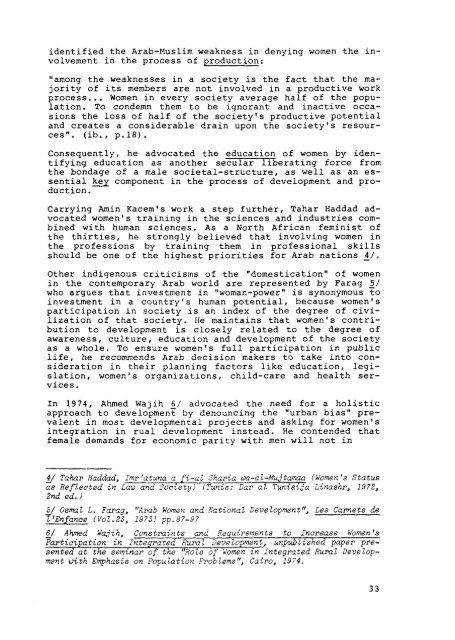Ifda dossier 47, May/June 1985
Ifda dossier 47, May/June 1985
Ifda dossier 47, May/June 1985
Create successful ePaper yourself
Turn your PDF publications into a flip-book with our unique Google optimized e-Paper software.
identified the Arab-Muslim weakness in denying women the in-<br />
volvement in the process of production:<br />
among the weaknesses in a society is the fact that the ma-<br />
jority of its members are not involved in a productive work<br />
process.. . Women in every society average half of the popu-<br />
lation. To condemn them to be ignorant and inactive occa-<br />
sions the loss of half of the society's productive potential<br />
and creates a considerable drain upon the society's resour-<br />
ces". (ib., p. 18).<br />
Consequently, he advocated the education of women by iden-<br />
tifying education as another secular liberating force from<br />
the bondage of a male societal-structure, as well as an es-<br />
sential % component in the process of development and pro-<br />
duction.<br />
Carrying Amin Kacem's work a step further, Tahar Haddad advocated<br />
women's training in the sciences and industries combined<br />
with human sciences. As a North African feminist of<br />
the thirties, he strongly believed that involving women in<br />
the professions by training them in professional skills<br />
should be one of the highest priorities for Arab nations 4/.<br />
Other indigenous criticisms of the "domestication" of women<br />
in the contemporary Arab world are represented by Farag 5/<br />
who argues that investment in "woman-power" is synonymous to<br />
investment in a country's human potential, because women's<br />
participation in society is an index of the degree of civilization<br />
of that society. He maintains that women's contribution<br />
to development is closely related to the degree of<br />
awareness, culture, education and development of the society<br />
as a whole. To ensure women's full participation in public<br />
life, he recommends Arab decision makers to take into consideration<br />
in their planning factors like education, legislation,<br />
women's organizations, child-care and health services.<br />
In 1974, Ahmed Wajih g/ advocated the need for a holistic<br />
approach to development by denouncing the "urban bias" pre-<br />
valent in most developmental projects and asking for women's<br />
integration in rual development instead. He contended that<br />
female demands for economic parity with men will not in<br />
- 4/ Tahar Haddad, Imr 'utuna a fi-at S'karia m-aZ-Mujtmaa (Women 'S Status<br />
as Reflected in Law and Society) (Tunis: Dar al Tunisija Linashr, 1972,<br />
2nd ed.<br />
S/ Osmt L. Farag, "Arab Women and National Development", Les Garnets de<br />
7'~nfance (VOL. 23, 1973) pp. 87-97<br />
- G/ Ahmed Wajih, Constraints and Requirements to Increase Women's<br />
Participation in Integrated Rural Uevp.Zoprnent, unpublished paper presented<br />
at the seminar of the "Role of Vornen in Intearated Rural, Develoumant<br />
with Emphasis on Population Problems", Cairo, 1974.
















